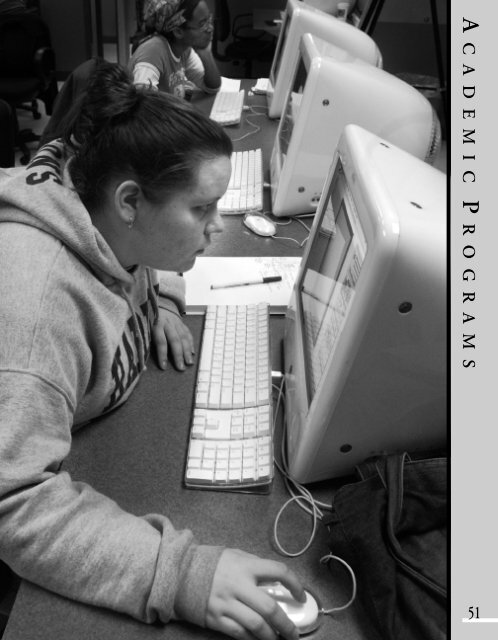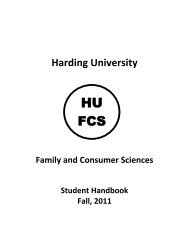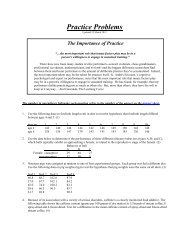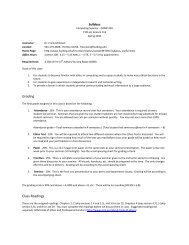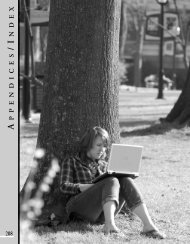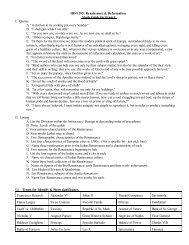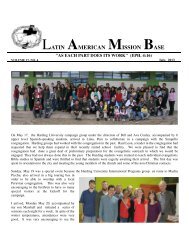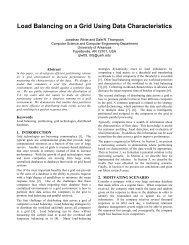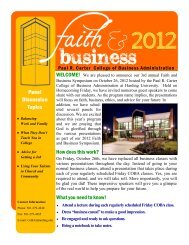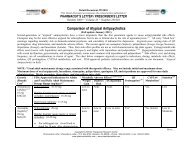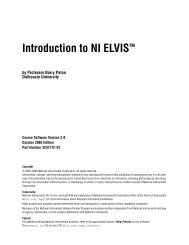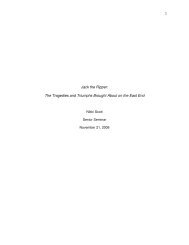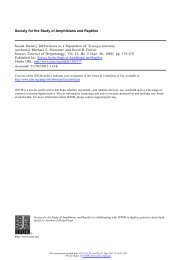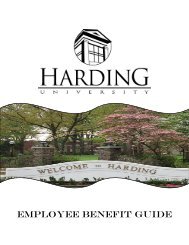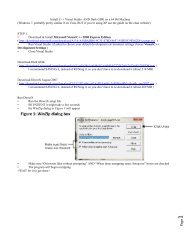51 C A D E M I C R O G R A M S - Harding University
51 C A D E M I C R O G R A M S - Harding University
51 C A D E M I C R O G R A M S - Harding University
You also want an ePaper? Increase the reach of your titles
YUMPU automatically turns print PDFs into web optimized ePapers that Google loves.
A C A D E M I C P R O G R A M S<br />
<strong>51</strong>
Interdepartmental Programs<br />
Interdepartmental programs transcend departmental boundaries. These 11 programs — the Academic<br />
Advising Center, the Academic Resources Center, ADVANCE, Cooperative Education, the Liberal Arts Program,<br />
the General Studies major, the Honors College, the Humanities major, International Programs, the McNair Scholars<br />
Program, and Student Support Services — vary greatly in size and scope. One — the Liberal Arts Program —<br />
is required of all students. The others are more specific in nature. All play an important role in supporting traditional<br />
academic programs.<br />
ACADEMIC ADVISING CENTER<br />
DIRECTOR: Harold Alexander, M.S.E.<br />
The mission of the Academic Advising Center (AAC)<br />
is to provide students with academic advising, support<br />
and pertinent information. The AAC also makes referrals<br />
to other offices on campus as appropriate, including<br />
the Career Center, Counseling Center, Academic<br />
Resource Center, Student Financial Services and all academic<br />
departments. The AAC coordinates advising<br />
programs for students who are General Studies majors<br />
and for students who have not yet declared a major.<br />
The AAC coordinates an “Early Alert!” system —<br />
designed to identify students who are experiencing academic<br />
challenges early in the semester — and then<br />
offers the necessary support and referrals to help students<br />
get back on track. In addition, the AAC works<br />
closely with some students who are on academic or<br />
financial aid probation, in most cases implementing<br />
an action plan aimed at helping students regain acceptable<br />
academic standing.<br />
ACADEMIC RESOURCES CENTER<br />
COORDINATOR: Dee Bost, Ed.D.<br />
The mission of the Academic Resources Center is to<br />
assist the <strong>University</strong> in maintaining standards of academic<br />
excellence consistent with Christian ideals by<br />
serving as a central location which provides information<br />
and services necessary for academic success and<br />
lifelong learning to all eligible students and faculty. A<br />
range of support activities, equipment and materials<br />
are included to:<br />
• Provide one-to-one and group tutoring in the content<br />
areas, learning enhancement workshops, and<br />
academic counseling that assists students in learning<br />
how to learn as effectively, efficiently and confidently<br />
as possible in their coursework.<br />
• Support student learning by means of supplementary<br />
materials and computer labs for additional drill/practice<br />
in learning skills and reading efficiency.<br />
• Provide faculty and staff with services and resources<br />
for improving learning and augmenting classroom<br />
instruction.<br />
• Provide a learning/working environment that is<br />
supportive of the academic, spiritual and social<br />
needs of all <strong>Harding</strong> <strong>University</strong> students.<br />
ADVANCE PROGRAM<br />
A C A D E M I C P R O G R A M S<br />
52<br />
DIRECTOR: Dee Bost, Ed.D.<br />
ASSISTING FROM OTHER DEPARTMENTS:<br />
PROFESSOR:<br />
Gene Dugger, M.S. (mathematics)<br />
ASSISTANT PROFESSORS:<br />
Klay Bartee, M.S.M.F.T.<br />
Kayla Haynie, M.A. (English)<br />
INSTRUCTOR:<br />
Chris Pruitt, M.Ed. (reading)<br />
The mission of ADVANCE is to help students become<br />
active, independent learners who possess the skills<br />
necessary to succeed across the curriculum. The program<br />
is designed for students who enter <strong>Harding</strong><br />
with ACT composites of 18 and below or O-SAT combined<br />
verbal-math scores of 770 and below or R-SAT<br />
scores of 890 and below.<br />
The ADVANCE curriculum consists of five courses<br />
and labs designed as leveling work for Liberal Arts<br />
courses. ADVANCE courses carry college credit and
A C A D E M I C P R O G R A M S<br />
count toward degree requirements only when they can<br />
be used as free electives. A grade of “C” is required to<br />
pass each course. Deficiencies in all areas must be<br />
satisfied within three semesters in order to complete<br />
the program and remain enrolled at <strong>Harding</strong>. Required<br />
tutoring policy: Students must maintain a “C” average<br />
in ADVANCE courses in order to receive credit.<br />
Tutoring will be required for all students whose grades<br />
fall below “C” average in any course in which they are<br />
enrolled while participating in the program, including<br />
ADVANCE courses. Tutoring will be scheduled<br />
by individual appointment in the Academic Resources<br />
Center on a regular basis (three hours weekly for<br />
three-hour courses; two hours weekly for two-hour<br />
courses) until the grade average improves to “C” or better.<br />
Students not complying with this policy will be<br />
dropped from the course(s) for which tutoring was<br />
required and will repeat the course(s) the following<br />
semester.<br />
ENG 100. BASIC ENGLISH. (3) Fall, Spring. Grammar<br />
and basic composition skills.<br />
MATH 100. BEGINNING ALGEBRA. (3) Fall, Spring.<br />
Basic arithmetic; introduction to elementary algebra.<br />
PSY 100. INTRODUCTION TO UNIVERSITY STUD-<br />
IES. (3) Fall, Spring. Instruction and practice in effective<br />
study habits and attitudes; availability and use of university<br />
resources; exploration of personal values and goals.<br />
RDNG 100/102(LAB). ACADEMIC READING I. (2)<br />
Fall, Spring. Mastering basic skills in reading, including<br />
reading efficiency and flexibility, reading selectively, increasing<br />
comprehension, developing vocabulary, interpreting<br />
and evaluating reading material.<br />
RDNG 101/103(LAB). ACADEMIC READING II. (2)<br />
Fall, Spring. Designed for students reading at near college<br />
level. Advanced practice and instruction in reading rate, vocabulary,<br />
comprehension, critical analysis and study reading.<br />
COOPERATIVE EDUCATION PROGRAM<br />
Students desiring on-the-job experience while helping<br />
finance their education should investigate cooperative<br />
education. The student may pursue an alternating plan<br />
of full-time work and full-time classes; a parallel plan<br />
of half-time work and part-time classes; a one-semester<br />
internship; or a summer program. A maximum of<br />
4 hours of elective credit in cooperative education is<br />
accepted for students transferring from a community<br />
college or other institution that grants credit for work<br />
assignments during the sophomore year. A maximum<br />
of 6 hours is accepted in transfer if at least 2 hours were<br />
earned after the sophomore year. Contact Deb Bashaw<br />
in the Career Center for additional information.<br />
367/567. COOPERATIVE EDUCATION. (1-6) Offered<br />
on demand. A program whereby formal classroom theory<br />
is applied to practical, career-related work experience. A faculty<br />
member designated by the department chairman supervise<br />
the work experience. Both written and oral reports are<br />
required. The department chairman may accept a maximum<br />
of 6 hours of credit to substitute for required or elective courses<br />
in the major. Prerequisite: sophomore standing, 2.0 GPA,<br />
and joint approval of the department chairman and the director<br />
of cooperative education.<br />
LIBERAL ARTS PROGRAM<br />
The Liberal Arts Program is a 54-hour core of basic<br />
courses required of all students. The program reflects<br />
the principles contained in the <strong>University</strong> mission<br />
statement and provides a foundation for study in<br />
major and minor fields.<br />
The mission of the Liberal Arts Program is to:<br />
1. Give all students a basic understanding of specific<br />
content areas;<br />
2. Develop essential and fundamental skills;<br />
3. Develop a Christian world view that brings a<br />
spiritual perspective to every academic discipline;<br />
and<br />
4. Nurture both a readiness for learning and an ethical<br />
consciousness that will sustain students for<br />
living in a world of complexity and change.<br />
The Liberal Arts Program course requirements are:<br />
Spiritual and Moral Values: 0 8<br />
BNEW 112 (New Testament); 2<br />
BOLD 101 (Old Testament) 2<br />
Two courses from BNEW 211<br />
(Life of Christ); BNEW 213<br />
(Acts of Apostles); BDOC 2<strong>51</strong> (Christian<br />
Ethics and Doctrine); BYFE 234<br />
(Christian Home); BOLD 202 (Ideas<br />
of Ancient Israel); or upper-level BOLD<br />
or BNEW courses. 4<br />
53
A C A D E M I C P R O G R A M S<br />
54<br />
Communication and Critical Thinking: 9<br />
ENG 111 or 113 (Composition I) 1 3<br />
ENG 211 (Composition II) 3<br />
COMO 101 (Speech Communication) 3<br />
The Individual and the Social Environment: 9<br />
PSY 201 (General Psychology) 2 3<br />
Social Science — one course from<br />
ECON 201 (Macroeconomics); POLS<br />
205 (American National Government) 3 ;<br />
SOC 203 (General Sociology) 4 3<br />
KINS 101 (Wellness) and one additional<br />
1-hour kinesiology recreation activity<br />
course. 5 3<br />
The Natural World: 9<br />
BIOL 111 (General Biology), BIOL<br />
113 (Human Structure and Function),<br />
or any biology course. 6 3<br />
MATH 200 (Statistics) or any<br />
mathematics course numbered 1<strong>51</strong><br />
or its equivalent. 7 3<br />
Physical Science — one course from PHS<br />
111 (Earth Science); 112 (Geology); 113<br />
(Astronomy and Space Science); 115<br />
(Energy, Pollution and Society); 116<br />
(Physical Science) 8 3<br />
The Creative Spirit: 7<br />
ART 101 (Art Appreciation) 2<br />
MUS 101 (Music Appreciation) 2<br />
ENG 201 or 202 (Literature of the<br />
Western World) 3<br />
The Historical Perspective: 6<br />
HIST 101 or 102 (American History) 9 3<br />
HIST 110 or 111 (Western Civilization) 3<br />
Global Literacy: 6<br />
Select from any modern foreign language<br />
courses; 10 ANTH 250; BIOL 250; BMIS<br />
280, 386, 387, 388; 11 GEOG 302 or 303; HNRS<br />
204 and 205; HUM 201 (International Programs<br />
only; 1-3 hours); IB 325, 345; INST 310; NURS<br />
344 and 413; POLS 202; SOCS 301.<br />
0 A student entering <strong>Harding</strong> as a first-time-in-college<br />
(FTIC) student is required to enroll in BNEW<br />
112 (fall) and BOLD 101 (spring). Students who<br />
transfer with more than 27 hours are required 8<br />
hours of textual study, which must include at least<br />
2 hours of both Old Testament and New Testament<br />
study.<br />
1 Entering freshmen with ACT English subscores of<br />
18 and below (SAT verbal of 440 and below) must<br />
pass ENG 100 as leveling work before enrolling in<br />
ENG 111 or 113.<br />
2 Students seeking teacher licensure must take EDFD<br />
203 in place of PSY 201.<br />
3 International students must take POLS 205.<br />
4 Students seeking teacher licensure at the secondary<br />
level must take POLS 205, and it is highly recommended<br />
that they take GEOG 302 or 303.<br />
Early childhood and middle childhood majors<br />
must take GEOG 302 or 303.<br />
5 Students who transfer to <strong>Harding</strong> with fewer than<br />
3 hours of kinesiology activity must take KINS 101.<br />
6 Kinesiology majors must take BIOL 113. Students<br />
seeking teacher licensure must take BIOL 111 or<br />
113.<br />
7 Students seeking teacher licensure must take<br />
MATH 1<strong>51</strong> or its equivalent. (MATH 200 is not<br />
an equivalent.) The Liberal Arts requirement in<br />
math may be met by achieving an ACT math score<br />
of 27 (SAT of 590).<br />
8 The physical science requirement may be satisfied<br />
by CHEM 114 or 121 or PHYS 201 or 211.<br />
9 International students must take HIST 101 or<br />
102.<br />
10 The global literacy requirement is waived for international<br />
students for whom English is a second language.<br />
Other students who wish to apply for a<br />
waiver on the basis of extended residence abroad<br />
may have their case considered by a review board.<br />
Appeals for waiver should be addressed to the Global<br />
Literacy Committee via the Office of the Vice<br />
President for Academic Affairs. Appeals should be<br />
presented with documentation (for example, report<br />
cards, yearbooks and visas) for the years abroad.<br />
11 Only one of ANTH 250 and BMIS 386 may<br />
count for global literacy. Only one BMIS course<br />
may count for global literacy. Only one course<br />
may count for both Bible and global literacy. Any<br />
biblical Greek class taken at HUG will count<br />
toward the global literacy requirement.
A C A D E M I C P R O G R A M S<br />
A.A. or A.S. degree graduates of junior and community<br />
colleges may satisfy <strong>Harding</strong>’s Liberal Arts<br />
requirements by completing the following broad-area<br />
curriculum: Bible (textual) — 8 hours; speech — 3<br />
hours; art or music appreciation — 2 hours; natural<br />
science — 6 hours; mathematics — 3 hours; social science<br />
(must include 6 hours of American and/or world<br />
history) — 12 hours; kinesiology activity — 3 hours;<br />
English composition and literature — 9 hours.<br />
Remedial courses do not count.<br />
Again, this plan applies only to graduates of junior<br />
and community colleges. Further, students who<br />
qualify for this plan and who are certifying to teach<br />
must still meet all Arkansas certification requirements.<br />
Non-graduates of junior and community colleges<br />
must meet <strong>Harding</strong>’s typical Liberal Arts requirements.<br />
However, upper-level courses may be substituted<br />
for lower-level ones.<br />
GENERAL STUDIES MAJOR<br />
The colleges of <strong>Harding</strong> <strong>University</strong> cooperate to offer<br />
an interdepartmental bachelor of arts degree in general<br />
studies. This degree is intended for students who<br />
need a creative plan of study that serves their professional<br />
aspirations better than established traditional<br />
majors. Students interested in this major should contact<br />
Harold Alexander, director of the Academic<br />
Advising Center.<br />
Graduation requirements include 128 hours with<br />
an overall GPA of 2.0, a 2.0 in the primary thematic<br />
concentration area (minimum 30 hours), and a 2.0 in<br />
the secondary thematic concentration area (minimum<br />
12 hours). In addition, all <strong>University</strong> graduation<br />
requirements apply, including completing and passing<br />
45 hours of upper-level coursework (courses numbered<br />
250 and higher at <strong>Harding</strong>).<br />
Specific coursework within a thematic area is determined<br />
in consultation with an appropriate chairman<br />
or dean in that area.<br />
Courses from the Liberal Arts Program may not be<br />
used to meet primary and secondary requirements. Any<br />
developmental course obligations are considered to be<br />
leveling work.<br />
BACHELOR OF ARTS DEGREE<br />
GENERAL STUDIES MAJOR (GS)<br />
128 TOTAL HOURS<br />
Adviser: Harold Alexander, M.S.E.<br />
Primary and secondary thematic concentrations<br />
may be chosen in these areas:<br />
AREA 1 (Arts and Humanities): art, Bible, communication<br />
(except communication disorders), English,<br />
foreign languages and international studies, geography,<br />
Greek, Hebrew, history, humanities, missions, music,<br />
philosophy.<br />
AREA 2 (Natural Sciences and Mathematics): biology,<br />
chemistry, computer science, mathematics,<br />
physical science, physics.<br />
AREA 3 (Behavioral and Social Sciences): anthropology,<br />
education, kinesiology (professional courses<br />
only), political science, psychology, social science,<br />
social work, sociology, criminal justice, TESL.<br />
AREA 4 (Business): accounting, business, computer<br />
information systems, economics, health care management,<br />
information technology, international business,<br />
management, marketing, professional sales.<br />
AREA 5 (Applied Sciences): communication disorders,<br />
cooperative education, family and consumer sciences,<br />
nursing.<br />
HONORS COLLEGE<br />
DEAN: Jeffrey T. Hopper, Ph.D.<br />
Debbie Baird, B.A., Assistant to the Dean<br />
Donna Jo Roberson, Secretary<br />
<strong>Harding</strong> offers two ways for qualified students to earn<br />
honors credits through its Honors College. The<br />
Honors Scholars Program and the Honors Students<br />
Program offer lower-level honors classes which will substitute<br />
for liberal arts courses. In addition, qualified students<br />
can earn honors credits through contracts in<br />
upper-level courses. Honors courses challenge and<br />
stimulate outstanding students to develop their intellectual<br />
and leadership abilities to the fullest.<br />
The Honors Students Program is open to all incom-<br />
55
A C A D E M I C P R O G R A M S<br />
56<br />
ing freshmen who score 27 or higher on the ACT (sum<br />
score of 1200 or higher on the SAT verbal and math<br />
sections) and who complete an application to the<br />
College. These students will be notified of their eligibility<br />
by the Honors College, and may choose from<br />
among a variety of honors sections of liberal arts<br />
courses listed in the class schedule each semester.<br />
Transfer students and other current students may also<br />
qualify for this tier of honors work by maintaining a<br />
3.25 cumulative grade point average.<br />
The Honors Scholars Program is open to incoming<br />
freshmen by invitation only. Students qualify by<br />
being named National Merit Finalists or Trustee Scholarship<br />
recipients or by being selected from the pool of<br />
applicants scoring 31 or higher on the ACT (sum<br />
score of 1330 or higher on the SAT verbal and math<br />
portions).<br />
Students who complete a minimum of four classes<br />
in either of these tiers qualify to earn honors credits in<br />
regular upper-level courses by negotiating new requirements<br />
that conform to Honors College guidelines.<br />
The Honors Senior Capstone Project is a senior<br />
honors thesis or project suitable for the student’s major.<br />
Students present their project in a public forum<br />
and are evaluated by Honors College representatives.<br />
A student who earns 10 or more hours of honors<br />
credit will be recognized upon graduation. To graduate<br />
from the Honors College, students must earn a<br />
minimum of 20 hours of honors credits, including at<br />
least four (H) sections or four HNRS courses and four<br />
honors contracts with a minimum overall GPA of<br />
3.25. Students who earn a minimum of 26 honors<br />
credits, complete a minimum of four (HNRS) courses<br />
or four honors (H) sections and a minimum of four<br />
honors contracts, successfully present an Honors<br />
Senior Capstone Project, and maintain an overall<br />
GPA of 3.50 will graduate from the Honors College<br />
with Distinction.<br />
The Honors College is a co-enrollment program,<br />
allowing students in the other six colleges of the<br />
<strong>University</strong> to participate.<br />
For more information contact Dr. Jeffrey T. Hopper,<br />
dean of the Honors College, Box 10838, <strong>Harding</strong><br />
<strong>University</strong>, Searcy, AR 72149, call (501) 279-4056, or<br />
e-mail honors@harding.edu.<br />
All Honors Scholars are required to take HNRS<br />
201, 202, and 2 courses from 100, 203, 204 and<br />
205. Credits earned in these courses apply to the liberal<br />
arts requirements as listed. Note: Some departments<br />
count these courses toward the liberal arts<br />
requirements but do not allow them to meet prerequisites<br />
in their majors. Students should consult their<br />
academic advisers.<br />
MINOR IN LEADERSHIP STUDIES<br />
The minor in leadership studies is an interdisciplinary<br />
curriculum offered through the Honors<br />
College, in cooperation with the Colleges of Arts and<br />
Humanities, Bible and Religion, Business Administration,<br />
Nursing, and Sciences.<br />
This minor is designed for students who desire to<br />
further develop their leadership strengths and abilities.<br />
The minor will complement any academic major.<br />
The purpose of the leadership studies minor is to<br />
bring focus to the divergent approaches in the study<br />
of leadership embodied within the curricula of the various<br />
colleges of the <strong>University</strong>. The leadership studies<br />
minor is therefore intended to provide a strong, broad<br />
foundation for the development of a servant leadership<br />
life style.<br />
Completing the leadership studies minor should<br />
provide the following outcomes:<br />
1. Knowledge of various leadership strategies<br />
2. Improved skills in communicating effectively as<br />
a leader<br />
3. Improved skills in interacting effectively with<br />
individuals and groups<br />
4. Improved management skills<br />
5. Confidence in integrating leadership skills within<br />
the specialized discipline of the student’s academic<br />
major
A C A D E M I C P R O G R A M S<br />
Students pursuing the minor must be a member of<br />
the Honors College in good standing (3.25 GPA).<br />
Contact Jeffrey T. Hopper, dean of the Honors College,<br />
for more information.<br />
Minor: 18 hours, including HNRS 204, HNRS 410,<br />
and at least one course from the Communication<br />
cluster. A minimum of four clusters must be represented.<br />
HNRS 204 is designed to be the fundamental<br />
leadership course and is a prerequisite or corequisite<br />
for the cluster courses.<br />
Course Clusters within Leadership Minor Curriculum<br />
1. Communication: Oral and Written<br />
2. Interpersonal Relations<br />
3. Management: Conflict Management and<br />
Organizational Management<br />
4. Foundations and Strategies of Leadership<br />
5. Applied Development of Leadership Skills<br />
Cluster 1 - Communication: Oral and Written<br />
COMO 210, BMIN 329, BMIN 325,<br />
ENG 291, ENG 281, BUS 350<br />
Cluster 2 - Interpersonal Relations<br />
COMO 260, BMIN 421, SWK 402,<br />
SOC 410, FCS 2<strong>51</strong>, BMIN 321, PSY<br />
380<br />
Cluster 3 - Management: Conflict Management<br />
and Organizational Management<br />
COMO 262, POLS 304, BMIN 424,<br />
MGT 310, MGT 368, SOC 350, BUS<br />
420, RECR 320, KINS 405, KINS<br />
408, BYFE 433<br />
Cluster 4 - Foundations and Strategies in<br />
Leadership<br />
BUS 435, PHIL 253, BMIN 322,<br />
MGT 440, BMIS 384, KINS 261<br />
Cluster 5 - Applied Development of Leadership<br />
Skills<br />
COMT 313, INST 310, LS 4<strong>51</strong>,<br />
SOCS 350, BMIS 388, NURS 413,<br />
BDOC 354<br />
HONORS (HNRS)<br />
100. HONORS SYMPOSIUM. (3) Summer. For students<br />
who have completed their junior year in high school. Designed<br />
to introduce prospective students to the academic programs<br />
at <strong>Harding</strong>. Content varies but generally centers on<br />
a specific topic or historical period and explores the subject<br />
from diverse viewpoints. A research project is required.<br />
Hours may be applied to the Creative Spirit (ART 101, MUS<br />
101, or ENG 201 or 202) or the Historical Perspective<br />
(HIST 101 or 102, or HIST 110 or 111) requirements in<br />
the liberal arts curriculum. Enrollment in this course does<br />
not require admission into the Honors College, nor does successful<br />
completion assure an invitation to the program.<br />
201. COMMUNICATION AND CRITICAL THINK-<br />
ING. (3) Fall. Designed to introduce students to the Honors<br />
Program, develop skills in critical thinking, and enhance<br />
skills in both written and oral communication. Hours<br />
may be applied to the Communication and Critical Thinking<br />
(COMO 101, ENG 111 or 211, requirement in the liberal<br />
arts curriculum. Required of all honors scholars.<br />
202. HONORS BIBLE: NEW TESTAMENT. (2) Fall. A<br />
discussion-centered survey of the New Testament; replaces<br />
BNEW 112. Required of all honors scholars except Bible<br />
majors.<br />
203. THE HUMAN SITUATION I: THE BIG QUES-<br />
TIONS. (3) Spring. Covers some major questions humanity<br />
has asked since the beginning of time. History, art,<br />
music and literature. Course content varies. Hours may be<br />
applied to the liberal arts requirements in the areas of the<br />
Creative Spirit (ART 101, MUS 101, or ENG 201 or 202)<br />
or the Historical Perspective (only HIST 110 or 111).<br />
204. THE HUMAN SITUATION II: SOCIAL SYS-<br />
TEMS. (3) Fall, Spring (upon sufficient demand). An analysis<br />
of Western world view with an emphasis on theories of<br />
leadership and human interaction, including the interpersonal,<br />
small group, intercultural, organizational and public<br />
sphere in the postmodern world. Required for the leadership<br />
studies minor. May be applied to the liberal arts requirements<br />
in the area of the Individual and Social Environment<br />
(PSY 201, ECON 201, POLS 205 or SOC 203 but not<br />
KINS 101) or Global Literacy.<br />
205. THE HUMAN SITUATION III: THE PHYSICAL<br />
WORLD. (3) Spring. Issues of nature, physical science,<br />
health, technology, ecology and mathematics. Course content<br />
varies. May be applied to the liberal arts requirements<br />
in the area of the Natural World (BIOL 111, MATH 200,<br />
PHS 111, 112, 113, 115 or 116) or Global Literacy.<br />
410. DIRECTED SENIOR PROJECT IN LEADER-<br />
SHIP. (1-2) On demand. This capstone project is required<br />
for the student who is completing a minor in leadership studies.<br />
The student will be actively involved in an approved leadership<br />
practicum. A portfolio will document the student’s<br />
progress and achievement in leadership development, including<br />
planning and implementation of the leadership role, selfevaluation<br />
reports of the leadership project, a critiqued<br />
videotape of an oral presentation, and meetings with a<br />
mentor. Prerequisite: senior standing, member of the Honors<br />
College in good standing (3.25 GPA), approval of the dean<br />
of the Honors College.<br />
57
The College of Arts and Humanities, through the<br />
cooperation of six of its departments, offers a bachelor<br />
of arts degree with a humanities major.<br />
This major is designed for students who desire a<br />
broad-based curriculum in the liberal arts. With roots<br />
in classical Greek and Roman languages and literature,<br />
humanities focuses on branches of knowledge concerned<br />
with human culture, such as philosophy, literature<br />
and the fine arts, as distinguished from the sciences.<br />
The humanities major provides preparation leading<br />
to careers in professions where human values are<br />
stressed, such as library science and law. The program<br />
provides a menu of courses from diverse disciplines<br />
while promoting more focused study in areas of<br />
individual interest.<br />
For more information about this major, students<br />
should consult the chairman of the department in<br />
which they are most interested.<br />
BACHELOR OF ARTS DEGREE<br />
HUMANITIES MAJOR (HUM)<br />
REQUIREMENTS<br />
HOURS<br />
Liberal Arts: 54<br />
Student must take ENG 201.<br />
Major: <strong>51</strong><br />
6 hours from each of these six departments:<br />
ART: ART 375, 430, 431, 432, 433,<br />
475 (1-3).<br />
COMMUNICATION: COMM 140<br />
HUMANITIES MAJOR<br />
(1), 201, 410; COMO 1<strong>51</strong> (1), 210<br />
(2), 260, 261; COMT 131 (1), 204,<br />
308, 450 (1-3).<br />
ENGLISH: ENG 202 (required), 2<strong>51</strong>,<br />
252, 271, 272, 360, 370, 371, 380,<br />
390, 400, 402, 404, 408, 409, 411,<br />
415, 418, 422, 425, 450 (1-3).<br />
FOREIGN LANGUAGES: Any modern<br />
foreign language 101 or higher not<br />
used for global literacy in Liberal Arts<br />
requirements.<br />
HISTORY: HIST 375, 377, 385, 395,<br />
405, 415, 425; POLS 450 (1-3).<br />
MUSIC: MUS 311, 312, 313, 314,<br />
450 (1-3).<br />
9 upper-level hours in one of the six<br />
departments above, plus HUM 460<br />
and PHIL 2<strong>51</strong>.<br />
Electives: 17<br />
11 hours from the College of Arts and<br />
Humanities or the College of Sciences,<br />
and 6 hours from any discipline.<br />
Remaining Bible: 6<br />
PHIL 2<strong>51</strong> is counted above in the<br />
hours required for the major.<br />
TOTAL HOURS 128<br />
HUM 460. DIRECTED SENIOR PROJECT IN HU-<br />
MANITIES. (3) Offered on sufficient demand. A capstone<br />
course to integrate the human values, ideas and philosophies<br />
presented in the interdisciplinary courses outlined in the<br />
major. Prerequisites: 30 hours of required courses.<br />
A C A D E M I C P R O G R A M S<br />
58<br />
DEAN: Jeffrey T. Hopper, Ph.D.<br />
Mary Lou Daughety, M.A., Administrative<br />
Assistant<br />
Debbie Baird, B.A., Assistant to the Dean<br />
Jerry Myhan, M.S.N., A.P.N., C.S., Director of<br />
HUG<br />
Dianne Myhan, B.A., Associate Director of HUG<br />
Vicky Tsakou, B.A., Assistant to the Director of<br />
HUG<br />
Robbie Shackelford, M.Ed., Director of HUF<br />
Ramona Shackelford, Associate Director of HUF<br />
INTERNATIONAL PROGRAMS<br />
Silvia Barbieri, HUF Office Manager<br />
Tracy Patterson, B.A., Assistant to the Director of<br />
HUF<br />
The International Programs have been specially<br />
designed to further enhance the stated mission of the<br />
university to help students develop a Christian understanding<br />
of and respect for other cultures. As an extension<br />
of the Searcy campus, these international experiences<br />
provide unique opportunities for study and<br />
travel overseas for both students and university faculty.<br />
STUDENT SUPPORT SERVICE
A C A D E M I C P R O G R A M S<br />
S<br />
The international living experience realized by the<br />
quantity and quality of time immersed in another<br />
culture yields insights and perspectives that can be<br />
gained in no other way. As with our university course<br />
offerings on the Searcy campus, the international programs<br />
of study provide rigorous, yet flexible courses<br />
of study by drawing from each unique international<br />
locale the best opportunities for expanded study and<br />
growth. Because of these unique experiences, students<br />
and university faculty develop lifelong relationships.<br />
The <strong>Harding</strong> <strong>University</strong> International Programs —<br />
academic programs based in Florence, Italy (HUF);<br />
London, England (HUE); Brisbane, Australia (HUA);<br />
Athens, Greece (HUG); Viña del Mar, Chile (HULA);<br />
and France/Switzerland (HUFS) — provide unique<br />
opportunities for study and travel overseas. No attempt<br />
is made to provide a broad general curriculum but<br />
rather to offer courses that may be studied with profit<br />
in a particular locale.<br />
Applications are accepted from students of <strong>Harding</strong><br />
<strong>University</strong> and other institutions. To participate in<br />
International Programs, students must have a 2.0<br />
GPA on 27 semester hours. Formal acceptance occurs<br />
the last full semester prior to the semester chosen for<br />
attendance.<br />
Note: No student is eligible to attend International<br />
Programs who is currently on academic, chapel or disciplinary<br />
probation on the Searcy campus. Any student<br />
who has applied and/or been accepted will automatically<br />
become ineligible if placed on any type of probation<br />
up until departure time. Such individuals will be<br />
placed on a waiting list and may go only if there are<br />
openings after probation has been lifted. If there are no<br />
openings, the application fee will be refunded.<br />
HUM 270, 275 or 280 is required for credit or<br />
audit by all participants. All participants must remain<br />
enrolled in a Bible class. All participants must remain<br />
enrolled for 12 credit hours.<br />
Students who attend HUF, HUFS, HUG and<br />
HULA must enroll in one of the offered foreign language<br />
courses. Any variance to this policy must be<br />
authorized by the dean of International Programs.<br />
Students who complete two Bible courses at HUG<br />
are exempt from one semester of Bible.<br />
Students interested should contact Dr. Jeffrey T.<br />
Hopper, Dean of International Programs, <strong>Harding</strong><br />
<strong>University</strong>, Box 10838, Searcy, AR 72149-0001; call<br />
(501) 279-4529; or e-mail intlprograms@harding.edu.<br />
The following courses are offered only on the overseas<br />
campuses and are supplemented by other courses.<br />
BHIS 140. MEDITERRANEAN WORLD. (3) Summer<br />
only. Offered in the <strong>Harding</strong> <strong>University</strong> International<br />
Program curriculum and at the Colorado Training Center.<br />
A survey of Pauline backgrounds including the cultural,<br />
linguistic and historical influences on early Christianity in<br />
the Mediterranean world of the first century.<br />
BHIS 346/546. BIBLE BACKGROUNDS. (2 or 3) Offered<br />
only in the <strong>Harding</strong> <strong>University</strong> European Studies curriculum.<br />
A study in Bible backgrounds utilizing the great museums<br />
and libraries of Europe (such as the British Museum,<br />
Louvre and Vatican). Classroom work coupled with research<br />
in the biblical collections of European museums and libraries.<br />
BNEW 313/<strong>51</strong>3. PAUL. (2 or 3) Offered only in the<br />
<strong>Harding</strong> <strong>University</strong> International Programs curriculum.<br />
The figure of Paul in the New Testament — as apostle,<br />
Roman citizen, missionary. Selected passages from Acts of<br />
the Apostles and Paul’s letters are examined. Background material<br />
relating to his apostleship to the Gentiles is examined<br />
in Europe and the Middle East. This or another course in<br />
Bible is required as part of International Programs.<br />
HUM 201. INTERNATIONAL STUDIES. (1-3) Offered<br />
only in the <strong>Harding</strong> <strong>University</strong> International Programs<br />
curriculum. Preparation for international experience in living<br />
and study in Europe or Australia. Enhancement in cultural<br />
sensitivity and practical matters of survival in a different<br />
cultural setting. Approximately 30 hours of classroom instruction<br />
plus “hands-on” experience in Europe, Asia, Latin<br />
America and Australia. Research on the host country.<br />
HUM 270. EUROPEAN CIVILIZATION AND<br />
HUMANITIES. (2-6) Offered only at HUE, HUF, HUFS<br />
and HUG. An integration of the disciplines of art, drama,<br />
history, literature, music, philosophy and religion stressing<br />
their shared thematic and stylistic qualities within the broad<br />
periods of Western civilization. Required of all students participating<br />
in the European programs. May substitute for 2-<br />
6 hours selected from the following: ART 101, ENG 201 or<br />
202, HIST 110 or 111, MUS 101, PHIL 2<strong>51</strong>, and one course<br />
from MUS 311, 312, 313 or 314. This course may not be<br />
used to raise a grade in any course previously taken.<br />
HUM 275. LATIN AMERICAN CIVILIZATION AND<br />
HUMANITIES. (2-6) Offered only at HULA. A cultural<br />
survey of Latin American art, drama, history, literature,<br />
music, philosophy, religion and science, and their influences<br />
in shaping ideas and values in this area of the world.<br />
Required of all students participating in the HULA program.<br />
May substitute for 2-6 hours selected from the following:<br />
ART 101, BIOL 250, ENG 201 or 202, HIST 111, MUS<br />
101 and PHIL 2<strong>51</strong>. This course may not be used to raise a<br />
grade in any course previously taken.<br />
59
HUM 280. AUSTRALASIAN CIVILIZATION AND<br />
HUMANITIES. (2-6) Offered only at HUA. An integration<br />
of the disciplines of art, drama, history, literature,<br />
music, philosophy, religion and science as they relate to<br />
the Pacific Rim; the integration of cultures, especially in<br />
Australia. Required of all students participating in the<br />
Australian program. May substitute for 2-6 hours selected<br />
from the following: ART 101, BIOL 250, ENG 201 or 202,<br />
HIST 111, MUS 101 and PHIL 2<strong>51</strong>. This course may not<br />
be used to raise a grade in any course previously taken.<br />
MGRK 100. MODERN GREEK. (3) Offered only in the<br />
HUG program. An introduction to modern Greek language<br />
and culture. Emphasis is given to basic grammatical<br />
structures and to oral communication in everyday situations.<br />
McNAIR SCHOLARS PROGRAM<br />
DIRECTOR: Linda Thompson, Ed.D.<br />
Barbara Cole, Ed.D., Assistant Director<br />
Named for Ronald McNair, the astronaut killed in the<br />
Challenger explosion, the Ronald E. McNair<br />
Postbaccalaureate Achievement Program, or McNair<br />
Scholars Program, is a federally funded TRIO project<br />
that aims to prepare first-generation/low-income students<br />
and students who are traditionally under-represented<br />
in graduate studies for graduate school.<br />
<strong>Harding</strong>’s program, funded by the Department of<br />
Education, serves 22 students per year.<br />
Undergraduate students who are U.S. citizens,<br />
who have completed at least one year of college with<br />
a 2.75 GPA or higher, and who are either low-income<br />
and first-generation college students or are from<br />
minority groups that are under-represented in graduate<br />
education are eligible for <strong>Harding</strong>’s McNair<br />
Scholars Program. The objective of the program is to<br />
provide enriching experiences that will enhance the students’<br />
academic abilities and prepare them for eventual<br />
doctoral study. Students who are selected for the<br />
program receive stipends to conduct research under the<br />
guidance of faculty mentors who represent the disciplines<br />
in which the students hope to pursue doctoral<br />
study. Students also receive extensive preparation for<br />
the Graduate Record Examination and for the graduate<br />
school application process. In addition, they<br />
attend and present at research conferences and travel<br />
to research institutions to meet with professors. The<br />
program also provides various workshops and activities<br />
designed to develop communication and personal<br />
skills.<br />
For more information about the McNair Scholars<br />
Program, students may call (501) 279-5269, or visit<br />
the McNair administrative office in the Lee Academic<br />
Center.<br />
A C A D E M I C P R O G R A M S<br />
60
A C A D E M I C P R O G R A M S<br />
TRIO STUDENT SUPPORT SERVICES<br />
DIRECTOR: James D. Johnston, Ed.D.<br />
STAFF:<br />
Anissa Harris, Ed.D., Instructional/Academic<br />
Coordinator<br />
Debbie Kemper, B.A., Counselor/Events<br />
Coordinator<br />
Teresa McLeod, M.Ed., Disabilities Specialist<br />
J. David White, M.S.M.F.T., L.A.C. C.P.A.C.,<br />
Counselor<br />
TRIO Student Support Services is a Title IV program<br />
funded by the federal government. The Student<br />
Support Services (SSS) program at <strong>Harding</strong><br />
serves 275 students who are admitted to the program<br />
if they are American citizens or nationals, interested<br />
in the program’s services, and meet one or more of the<br />
following criteria:<br />
1. First-generation college student. Neither parent<br />
has obtained a baccalaureate degree.<br />
2. Financially qualified student. Eligibility is based<br />
on the family’s taxable income.<br />
<strong>Harding</strong> offers preprofessional curricula in 12 academic<br />
areas, largely through the College of Arts and<br />
Humanities and the College of Sciences. While a baccalaureate<br />
degree is offered specifically in only one of<br />
these areas (medical technology), students are encouraged<br />
to earn a degree in the area of their interest<br />
whenever possible. Having a degree enhances their<br />
chances of being admitted to a professional school.<br />
Majors involving business, dietetics, mathematics,<br />
the natural sciences, nursing, psychology, and vocational<br />
family and consumer sciences assume the<br />
student has adequate high school preparation in mathematics<br />
— at least a year and a half of algebra and a<br />
year of plane geometry. If the student is deficient in<br />
mathematics, he or she must take MATH 105 before<br />
taking 1<strong>51</strong> or 152. If the student has a good background<br />
in high school mathematics, he or she should<br />
take MATH 171 or 201 (MATH 200 for those in business)<br />
in lieu of 1<strong>51</strong>, 152.<br />
Advising and preprofessional courses are available<br />
Preprofessional Programs<br />
3. Student with a professionally documented disability.<br />
Upon documentation of the disability,<br />
the program provides or recommends provision<br />
of academic accommodations.<br />
All program services and activities are designed to<br />
meet the academic and personal/social needs of eligible<br />
students within the university environment.<br />
All services are provided free of charge. These include<br />
one-on-one peer tutoring/study skills sessions, staffed<br />
by certified student personnel who provide tutoring in<br />
individual subject areas; counseling provided by qualified<br />
professional counselors in the areas of career guidance,<br />
personal counseling, financial aid counseling,<br />
academic counseling, and learning styles diagnosis; test<br />
accommodations for qualified students, including oral<br />
testing, extended-time testing, and private testing in a<br />
non-distracting environment; and academic advising.<br />
SSS Students are also offered free attendance at cultural<br />
events such as opera performances in Memphis<br />
and the dinner theater in Little Rock. Additional<br />
activities include a short ropes course and a leadership<br />
training retreat.<br />
for students preparing for careers as other professionals<br />
such as chiropractors, dental hygienists, occupational<br />
therapists and physician assistants.<br />
Students should obtain a current catalog of the professional<br />
school they plan to attend and, together<br />
with their advisers, devise a program of study that will<br />
maximize their experience at <strong>Harding</strong> and prepare<br />
them for admission to their chosen professional school.<br />
61
A C A D E M I C P R O G R A M S<br />
PREAGRICULTURE<br />
ADVISER: John W. Moon Jr., Ph.D.<br />
Students planning agriculture as a profession may<br />
take one year or, in certain cases, two years of preagriculture<br />
training at <strong>Harding</strong>. The following is a suggested<br />
program of study.<br />
First Year<br />
Semester Hours<br />
BIOL 121,122................................................................8<br />
CHEM 121,122 ............................................................8<br />
ENG 111; 201 or 202 ....................................................6<br />
HIST 101 or 102 ..........................................................3<br />
KINS 101 ......................................................................2<br />
BNEW 112, BOLD 101 ................................................4<br />
Total ........................................................................31<br />
Second Year<br />
Semester Hours<br />
BIOL 271, 259 ..............................................................8<br />
CHEM 215....................................................................4<br />
ENG 211 ......................................................................3<br />
COMO 101 ..................................................................3<br />
Electives*........................................................................8<br />
BNEW 211, 213, BDOC 2<strong>51</strong>, BYFE 234 (any 2) ........4<br />
Total ........................................................................30<br />
* SOC 203 is recommended for transfer to the <strong>University</strong><br />
of Arkansas.<br />
PREARCHITECTURE<br />
ADVISER: John E. Keller, Ph.D.<br />
Architectural schools generally require a minimum<br />
of four years in residence. If the program is a six-year<br />
schedule, then two years may be taken at <strong>Harding</strong>. If<br />
the program is a five-year schedule, only one year at<br />
<strong>Harding</strong> may be transferred. For students who prefer<br />
two years at <strong>Harding</strong>, the following program is recommended.<br />
If only one year can be taken at <strong>Harding</strong>, an<br />
adviser can prepare an appropriate one-year program.<br />
In either case, it is helpful to know the requirements<br />
of the school to which the student wishes to transfer.<br />
Students transferring to another university may be<br />
required to take specific courses at that university<br />
before being accepted into their architectural program.<br />
For students who prefer to stay at <strong>Harding</strong> for<br />
four years, the Interior Design degree at <strong>Harding</strong><br />
offers an excellent foundation for future study in an<br />
architectural program.<br />
First Year<br />
Semester Hours<br />
ART 102 or 103, 104 or 106..........................................6<br />
ART 221 ........................................................................3<br />
ENG 111; 201 or 202 ....................................................6<br />
MATH 171, 201 ..........................................................10<br />
KINS 101 ......................................................................2<br />
BNEW 112, BOLD 101 ................................................4<br />
ART 101 ........................................................................2<br />
Total ........................................................................33<br />
Second Year<br />
Semester Hours<br />
IT 101, ECON 201 ......................................................6<br />
HIST 101 or 102, 110 or 111 ........................................6<br />
MATH 2<strong>51</strong>, 301 ............................................................8<br />
PHYS 211, 212 ..............................................................8<br />
BNEW 211, 213, BDOC 2<strong>51</strong>, BYFE 234 (any 2) ........4<br />
Total ........................................................................32<br />
PREDENTISTRY<br />
ADVISER: Ronald Doran, M.S.<br />
Admission to dental schools requires a minimum<br />
of three years of college and satisfactory GPA and<br />
Dental Admissions Test (DAT) scores. However, preference<br />
is given to those with a bachelor’s degree. The<br />
student may elect any major, but the program of<br />
study should include the following: nine hours of<br />
English, eight hours of inorganic chemistry, eight<br />
hours of physics, and eight-16 hours of biology. It is<br />
advisable to complete the listed courses before taking<br />
the DAT. Course requirements beyond those listed vary<br />
from school to school, so it is advisable to check with<br />
the dental schools where the student might apply.<br />
Other courses that are highly recommended include<br />
psychology, sociology, business management, foreign<br />
language, and any course that improves manual dexterity<br />
and eye/hand coordination (such as drawing,<br />
sculpture, ceramics).<br />
The student who wishes to apply to a dental school<br />
after three years should follow the curriculum outlined<br />
below. Upon request, <strong>Harding</strong> will confer the bachelor<br />
of science degree with a major in general science<br />
on students who complete two years in an approved<br />
school of dentistry and who satisfy the other requirements<br />
for graduation.<br />
62
A C A D E M I C P R O G R A M S<br />
First Year<br />
Sem. Hrs. (Fall, Spring)<br />
CHEM 121, 122........................................................4, 4<br />
MATH 171*; BIOL 121 ............................................5, 4<br />
ENG 111; 201 or 202 ................................................3, 3<br />
HIST 101 or 102 ......................................................0, 3<br />
BNEW 112, BOLD 101 ............................................2, 2<br />
ART or MUS 101 ......................................................2, 0<br />
BIOL 140 ..................................................................0, 0<br />
Total ..................................................................16, 16<br />
Second Year<br />
Sem. Hrs. (Fall, Spring)<br />
CHEM 249, 250........................................................4, 4<br />
BIOL 122, 259 ..........................................................4, 4<br />
PSY 201; ART 101 or MUS 101................................3, 2<br />
ENG 211; COMO 101..............................................3, 3<br />
BNEW 211, 213, BDOC 2<strong>51</strong>, BOLD 202, BYFE 234<br />
(any 2)........................................................................2, 2<br />
KINS 101 ..................................................................0, 2<br />
Total ..................................................................16, 17<br />
Third Year ..............................Sem. Hrs. (Fall, Spring)<br />
Upper level biology elective ........................................4, 0<br />
PHYS 201, 202 ..........................................................4, 4<br />
Bible ........................................................................2, 2<br />
BIOL 440 or CHEM 440 ..........................................0, 0<br />
KINS activity ............................................................1, 0<br />
ECON 201, SOC 203**, or POLS 205......................0, 3<br />
ART 101 or MUS 101 ..............................................2 ,0<br />
HIST 110 or 111 ......................................................0, 3<br />
Global Literacy ..........................................................3, 3<br />
Total ................................................................16, 15<br />
* MATH 201 for those with a strong math background.<br />
** Strongly recommended by several dental schools.<br />
PRELAW<br />
ADVISER: Kevin Klein, Ph.D.<br />
A strong liberal arts education, which is considered<br />
by law schools to be the best prelegal preparation, provides<br />
a stable foundation for future law school success.<br />
<strong>Harding</strong> <strong>University</strong> offers such preparation through its<br />
preprofessional program in law. Because law schools<br />
generally do not require specific undergraduate majors,<br />
one can major in any undergraduate field. However,<br />
future benefits can be gained by concentrating studies<br />
in such areas as business, communication, English,<br />
history, political science, public administration and social<br />
science. Courses for majors in these departments<br />
require a higher degree of written work and group discussion,<br />
thus preparing students for the nature of law<br />
school courses. Students, upon entry into a law school,<br />
must have mastered expression and comprehension of<br />
the English language, and be thoroughly acquainted<br />
with American institutions, values and culture. The<br />
Law School Admissions Test, required by most law<br />
schools, stresses critical thinking and writing ability.<br />
<strong>Harding</strong>’s challenging, Christian liberal arts curriculum,<br />
along with the extensive number of undergraduate<br />
law classes and other unique opportunities<br />
that prelaw students enjoy, provide a solid background<br />
to students desiring careers in law.<br />
PRELIBRARY SCIENCE<br />
ADVISER: Ann Dixon, M.L.S.<br />
The master’s degree in library/information science<br />
is considered the entry-level degree for the profession.<br />
<strong>Harding</strong> <strong>University</strong> does not offer an undergraduate<br />
degree in librarianship but recommends the following<br />
plan to students contemplating such a career:<br />
1. Develop a broad background in the liberal arts<br />
by electing courses in humanities, natural sciences<br />
and social sciences.<br />
2. Choose a major of particular interest. Libraries<br />
search for professionals with a wide range of subject<br />
specialties.<br />
3. Arrange a counseling appointment with the library<br />
director to discuss undergraduate course<br />
options, library experience opportunities, and<br />
accredited graduate schools.<br />
4. If school librarianship is the goal, students should<br />
take the professional education courses required<br />
for certification by the state in which they plan<br />
to work.<br />
PREMEDICAL TECHNOLOGY<br />
ADVISER: Dennis Province, Ph.D.<br />
The departments of biology, mathematics and<br />
physical science cooperate to offer the basic science<br />
requirements to qualify students for an affiliated and<br />
approved hospital school of medical technology for one<br />
year of clinical training. Students who complete the<br />
three-year program outlined below, subsequently complete<br />
the clinical program of work in an approved<br />
hospital school of medical technology, have a transcript<br />
of the completed clinical program sent to the registrar,<br />
and complete the other cataloged requirements for<br />
graduation become candidates for the bachelor of science<br />
in medical technology (B.S.M.T.) degree. The<br />
63
A C A D E M I C P R O G R A M S<br />
64<br />
equivalent of 36 semester hours of upper-level credit is<br />
granted for the successfully completed clinical program.<br />
Students have the responsibility of making application<br />
and gaining admission to an approved clinical<br />
program, although <strong>Harding</strong> will provide counsel and<br />
assistance. Currently, <strong>Harding</strong> has affiliation with:<br />
Arkansas Baptist Medical Center, Little Rock, AR<br />
72205 — Program Director: Sandy Ackerman, M.Ed.,<br />
MT (ASCP) SH.<br />
Students interested in pursuing the clinical year in<br />
a hospital other than Arkansas Baptist should consider<br />
pursuing a biology degree while fulfilling the prerequisites<br />
for that program and applying after receiving<br />
a bachelor’s degree.<br />
Because admission to the clinical year is highly<br />
competitive, it is recommended that students achieve<br />
above a 3.0 GPA on the 92 hours of preclinical courses<br />
outlined below. At least 32 of the last 40 semester<br />
hours immediately preceding entry into the clinical<br />
year, including at least 12 upper-level hours in the sciences,<br />
must be completed at <strong>Harding</strong> with a minimum<br />
2.0 GPA. Students planning to pursue the B.S.M.T.<br />
degree should obtain a written statement of approval<br />
from <strong>Harding</strong>’s vice president for academic affairs<br />
before beginning the professional program in an affiliated<br />
hospital. If the cooperating institution confers the<br />
baccalaureate, <strong>Harding</strong> will not confer a second one.<br />
First Year<br />
Sem. Hrs. (Fall, Spring)<br />
CHEM 121, 122........................................................4, 4<br />
ENG 111; 201 or 202 ................................................3, 3<br />
HIST 101 or 102; 110 or 111 ....................................3, 3<br />
MATH 1<strong>51</strong>, COMO 101 ..........................................3, 3<br />
KINS 101 ..................................................................0, 2<br />
BNEW 112, BOLD 101 ............................................2, 2<br />
Total ................................................................15, 17<br />
Second Year<br />
Sem. Hrs. (Fall, Spring)<br />
CHEM 249................................................................4, 0<br />
PSY 201 ....................................................................3, 0<br />
BIOL 259 ..................................................................0, 4<br />
BIOL 271 ..................................................................0, 4<br />
Global Literacy**, ENG 211 ......................................3, 3<br />
ART 101, MUS 101 ..................................................2, 2<br />
KINS activity ............................................................1, 0<br />
BNEW 211, 213, BDOC 2<strong>51</strong>, BYFE 234 (any 2) ....2, 2<br />
Total ................................................................15, 15<br />
Third Year<br />
Sem. Hrs. (Fall, Spring)<br />
CHEM 261, Global Literacy** ..................................4, 3<br />
BIOL 249, 253, 315 (any 2) ......................................4, 4<br />
Electives from BIOL, CHEM, COMP, IT, MATH<br />
and PHYS** ..............................................................4 ,4<br />
ECON 201, SOC 203, or POLS 205 ........................0, 3<br />
Bible ........................................................................2, 2<br />
Total ................................................................14, 16<br />
* 6 hours of Global Literacy as specified in the liberal arts<br />
requirements.<br />
** CHEM 250 is recommended and is required by some<br />
medical technology schools. Courses strongly recommended:<br />
BIOL 249, BIOL 253 or 315, CHEM 325 if CHEM<br />
324 is taken, IT 101, MATH 200, PHYS 201, PHYS 202.<br />
PREMEDICINE<br />
ADVISER: Deborah G. Duke, Ed.D.<br />
Most schools of medicine require for admission a<br />
minimum of three years of college work with a strong<br />
GPA and relatively high scores on the Medical College<br />
Admissions Test (MCAT); however, preference is<br />
given to those who have a bachelor’s degree. Students<br />
who wish to complete a baccalaureate degree before<br />
transferring to medical school may elect any major. It<br />
should be remembered that the Medical College Admissions<br />
Test is based on a science and verbal emphasis,<br />
and the program of study should be planned<br />
accordingly. Upon request, <strong>Harding</strong> will confer the<br />
bachelor of science degree with a major in general science<br />
on students who complete two years in an<br />
approved school of medicine and who meet <strong>Harding</strong>’s<br />
Liberal Arts and premedical requirements.<br />
Although students may choose any major, the following<br />
courses should be included in their academic<br />
plans for the first three years. These courses are necessary<br />
to prepare for the Medical College Admissions<br />
Test, which should be taken in the spring semester of<br />
the junior year. Most medical schools require many,<br />
if not all, of these courses as prerequisites. Additional<br />
science electives are also recommended.<br />
First Year<br />
Sem. Hrs. (Fall, Spring)<br />
CHEM 121, 122* ......................................................4, 4<br />
MATH 171, 201* ......................................................5, 5<br />
ENG 111, 211 ............................................................3,3<br />
Second Year<br />
Sem. Hrs. (Fall, Spring)<br />
CHEM 249, 250........................................................4, 4<br />
BIOL 259 ..................................................................0, 4
A C A D E M I C P R O G R A M S<br />
Third Year<br />
Sem. Hrs. (Fall, Spring)<br />
PHYS 201, 202** ......................................................4, 4<br />
BIOL Electives*** ......................................................4, 4<br />
CHEM 324................................................................3, 0<br />
* Students inadequately prepared for MATH 171 or CHEM<br />
121 must first take leveling courses.<br />
** Or PHYS 211-212.<br />
*** BIOL electives may be selected from BIOL 121, 249,<br />
253, 261, 271, 280, 315, 425 and 471.<br />
PRENURSING<br />
ADVISER: Jeanne Castleberry, M.B.A.<br />
The prenursing curriculum prepares the student for<br />
admission to <strong>Harding</strong>’s College of Nursing. Students<br />
may complete their preparation in two years.<br />
Application to the College of Nursing must be made<br />
the semester prior to desired admission. Students<br />
must follow the science course sequence carefully to<br />
ensure all prerequisites are met. For further information,<br />
refer to the College of Nursing section in this catalog<br />
or contact the assistant to the dean at nursing@harding.edu.<br />
First Year<br />
Sem. Hrs. (Fall, Spring)<br />
*CHEM 215, 216# ....................................................4, 0<br />
*BIOL 249 ................................................................0, 4<br />
*ENG 111##,*PSY 201..............................................3, 3<br />
*NURS 100................................................................1, 0<br />
ENG 201, 202 ..........................................................0, 3<br />
COMO 101, **HIST 101/102 ................................3, 3<br />
KINS 101, elective ....................................................2, 1<br />
ART 101 and MUS 101 ............................................2, 2<br />
BNEW 112, BOLD 101 ............................................2, 2<br />
Total ......................................................................17, 18<br />
Second Year<br />
Sem. Hrs. (Fall, Spring)<br />
*BIOL 253, *271........................................................4, 4<br />
*FCS 323 ..................................................................3, 0<br />
*FCS 331 ..................................................................0, 3<br />
ENG 211 ..................................................................3, 0<br />
*NURS 203................................................................3, 0<br />
*#NURS 300..............................................................0, 5<br />
*NURS 363................................................................0, 2<br />
BNEW 211, 213, BDOC 2<strong>51</strong>, BYFE 234 ................2, 2<br />
*SOCS 203 ................................................................3, 0<br />
Total ......................................................................18, 16<br />
This schedule is a suggestion only. Students adhering<br />
to this schedule will need to complete 6 hours of<br />
global literacy courses after admission to the College<br />
of Nursing Level I and/or Level II study, and 3 hours<br />
of liberal arts requisites such as HIST 110 or 111<br />
during Level II study.<br />
* These prerequisite courses must be completed with a<br />
minimum grade of “C” or higher prior to admission to the<br />
College of Nursing. Completion of BIOL 249 is strongly<br />
recommended prior to taking NURS 203. BIOL 249 and<br />
253 and CHEM 215/216 must be completed prior to taking<br />
NURS 363. Students are strongly encouraged not to<br />
enroll in more than two courses with laboratory requirements<br />
during a single semester.<br />
# If a student has taken less than two years of high school<br />
algebra the student is strongly encouraged to take MATH<br />
105 prior to enrolling in CHEM 215 (or during the summer<br />
session preceding the fall semester of the first year). A<br />
pre-test will be given to determine knowledge of chemistry.<br />
CHEM 114 may be required prior to CHEM 215.<br />
## If a student achieved 18 or lower on the ACT English<br />
subscore, ENG 100 must be taken prior to taking ENG 111.<br />
NOTE: NURS 100, 203, 300 and 363 are offered during<br />
the summer session. Summer course offerings are dependent<br />
on sufficient enrollment. Students are strongly encouraged<br />
to complete NURS 300 and 363 the semester prior<br />
to entering the College of Nursing. Academic credit for<br />
NURS 300 or 363 will not be counted toward the nursing<br />
degree until the student is admitted into the College of<br />
Nursing. Students who enroll in any nursing course consent<br />
to participate in the learning activities required in that<br />
course in order to progress in the nursing curriculum.<br />
Students may be asked to submit to random screening for<br />
drug use according to clinical agency and/or university policy.<br />
Most employers of registered nurses require drug screening measures<br />
to protect the public. Students are expected to self-report<br />
a history of drug abuse to the board of nursing.<br />
PREOPTOMETRY<br />
ADVISER: Dennis Province, Ph.D.<br />
A Doctors of Optometry (O.D.) degree is required<br />
to work as an optometrist. Most schools of optometry<br />
require three years (90 credits) of undergraduate<br />
work for admission. Some schools of optometry now<br />
require a bachelor degree prior to admittance. The<br />
Optometry Admissions Test (OAT) is also required for<br />
optometry school and needs to be taken at least a<br />
year in advance of applying. Each of the 17 optometry<br />
schools in the United States and Puerto Rico has<br />
slightly different requirements. The basic requirements<br />
for most schools are contained below in the suggested<br />
schedule. It is essential that the applicant obtain<br />
a catalog from the specific school or college of optometry<br />
where he or she plans to apply to see what changes<br />
65
A C A D E M I C P R O G R A M S<br />
66<br />
are needed. The Association of Schools and Colleges<br />
of Optometry has a Web site of information on all of<br />
the schools of optometry at www.opted.org.<br />
First Year<br />
Sem. Hrs. (Fall, Spring)<br />
CHEM 121, 122........................................................4, 4<br />
ENG 111 ..................................................................0, 3<br />
BIOL 121 ..................................................................4, 0<br />
MATH 171, 201 ........................................................5, 5<br />
KINS 101 ..................................................................0, 2<br />
BNEW 112, BOLD 101 ............................................2, 2<br />
Total ................................................................15, 16<br />
Second Year<br />
Sem. Hrs. (Fall, Spring)<br />
BIOL 259 ..................................................................0, 4<br />
CHEM 249* ..............................................................4, 0<br />
PHYS 201, 202 ..........................................................4, 4<br />
MATH 200 ................................................................3, 0<br />
ENG 211 ..................................................................3, 0<br />
PSY 201** ..................................................................0, 3<br />
Bible ........................................................................2,2<br />
Total ................................................................16, 13<br />
Third Year<br />
Sem. Hrs. (Fall, Spring)<br />
BIOL 271, Biology or Chemistry Electives*** ............4,4<br />
Biology or Chemistry Electives*** ..............................4,4<br />
COMO 101 ................................................................3,0<br />
Kinesiology Activity ....................................................1,0<br />
SOC 203 ....................................................................0,3<br />
ECON 201 ................................................................0,3<br />
Bible ........................................................................2,2<br />
Total ..................................................................14,16<br />
*Some schools require two semesters of organic chemistry.<br />
**Many schools require two semesters of psychology.<br />
***BIOL 249, BIOL 253 or CHEM 324 are required by<br />
some schools.<br />
PREPHARMACY<br />
ADVISER: David Cole, Ph.D.<br />
Schools of pharmacy typically require two years of<br />
preprofessional course work before application to<br />
pharmacy school. Most pharmacy schools have a fouryear<br />
preprofessional program leading to a Doctor of<br />
Pharmacy degree (Pharm.D). Because of the emphasis<br />
on science and math, many students complete<br />
their preprofessional course work with an additional<br />
summer or over a three-year period. The Pharmacy<br />
College Admissions Test (PCAT) must be taken before<br />
March 1 in order to be considered for admission to<br />
pharmacy school the following fall. The following<br />
outline meets the entrance requirements of the College<br />
of Pharmacy at the <strong>University</strong> of Arkansas for Medical<br />
Sciences. Other pharmacy schools have similar requirements<br />
but may require microbiology, statistics and/or<br />
second semester physics.<br />
First Year<br />
Sem. Hrs. (Fall, Spring)<br />
BIOL 121 ..................................................................0, 4<br />
CHEM 121, 122* ......................................................4, 4<br />
MATH 201* ..............................................................5, 0<br />
ENG 111, COMO 101..............................................3, 3<br />
BNEW 112, BOLD 101 ............................................2, 2<br />
Electives** ..................................................................3, 3<br />
Total ................................................................17, 16<br />
Second Year<br />
Sem. Hrs. (Fall, Spring)<br />
CHEM 249, 250........................................................4, 4<br />
PHYS 201, 202*** ....................................................4, 4<br />
MATH 200***; ECON 201 or 202............................3, 3<br />
BIOL 271 ..................................................................0, 4<br />
ENG 211 ..................................................................3, 0<br />
BNEW 211, 213, BDOC 2<strong>51</strong>, BYFE 234 (any 2) ....2, 2<br />
Total ................................................................16, 17<br />
* Students inadequately prepared for MATH 201 or CHEM<br />
121 must take leveling courses.<br />
** Electives must be in humanities or liberal arts.<br />
*** 6 hours must be selected from PHYS 202, MATH 200,<br />
2<strong>51</strong>, CHEM 261, or ACCT 205
A C A D E M I C P R O G R A M S<br />
PREPHYSICAL THERAPY<br />
ADVISER: Bryan Phillips, Ph.D.<br />
Entrance to physical therapy school is very competitive.<br />
A bachelor’s degree is recommended. Most<br />
schools of physical therapy require a bachelor’s degree<br />
for admittance into their program, as well as specific<br />
prerequisite courses. Students should maintain a minimum<br />
3.5 GPA. Many schools require the Graduate<br />
Record Exam (GRE). Observing or aiding a licensed<br />
physical therapist is also required by most physical therapy<br />
schools.<br />
Students should obtain admissions requirements to<br />
the school they plan to attend and arrange curriculum<br />
accordingly. A booklet listing all of schools of physical<br />
therapy in the United States may be obtained by<br />
writing the American Physical Therapy Association,<br />
1111 N. Fairfax St., Alexandria, VA 22314. The booklet,<br />
Careers in Physical Therapy, is updated annually.<br />
Information can also be found online at www.apta.org.<br />
Students are encouraged to contact the physical<br />
therapy school they wish to attend to determine prerequisite<br />
courses. Students are also encouraged to<br />
contact the prephysical therapy adviser for guidance<br />
in planning coursework.<br />
PREPHYSICIAN ASSISTANT<br />
ADVISER: Deborah G. Duke, Ed.D.<br />
The majority of physician assistant programs grant<br />
a master’s degree, although there are still certificate and<br />
bachelor’s degree programs. About three-fourths of all<br />
students entering a physician assistant program have<br />
already completed a bachelor’s degree. No particular<br />
major is required, but a strong science background is<br />
desirable and certain prerequisite courses must be<br />
completed. Although the courses listed below are a<br />
good basis for many physician assistant programs,<br />
students should research the schools to which they<br />
intend to apply to be sure they complete all requirements.<br />
<strong>Harding</strong> <strong>University</strong>’s Physician Assistant<br />
Program is a master’s-level program and requires a<br />
bachelor’s degree for admission. Prerequisites for<br />
<strong>Harding</strong>’s program are listed below in bold type.<br />
Additional information regarding <strong>Harding</strong>’s program<br />
can be found at www.harding.edu/paprogram. The<br />
Physician Assistant Education Association maintains<br />
a Web site at www.apap.org, which includes links to<br />
all accredited Physician Assistant programs.<br />
First Year<br />
Sem. Hrs. (Fall, Spring)<br />
*CHEM 121, 122 and 215/216 ................................4, 8<br />
*MATH 1<strong>51</strong>, 171 or 201, PSY 201........................3-5, 3<br />
Second Year<br />
Sem. Hrs. (Fall, Spring)<br />
BIOL 249, 253..........................................................4, 4<br />
PSY 240, BIOL 271 ..................................................3, 3<br />
Third Year<br />
Sem. Hrs. (Fall, Spring)<br />
**Further requirements or electives ......................3-8, 3-8<br />
* Students inadequately prepared for MATH 1<strong>51</strong> or CHEM<br />
121 must first take leveling courses.<br />
**Some suggested electives are BIOL 254, 259, 315, 425,<br />
471; CHEM 324; PSY 325, 382; FCS 331, 461; SOC<br />
203, 345.<br />
PREVETERINARY MEDICINE<br />
ADVISER: Mike Plummer, Ph.D.<br />
This program is essentially the same as that outlined<br />
for medicine. Veterinary schools usually require scores<br />
on the Veterinary Aptitude Test (VAT), the Medical<br />
College Admissions Test (MCAT), or the Graduate<br />
Record Exam (GRE) as part of the application. Residents<br />
of Arkansas should register with the Coordinator for<br />
Veterinary Medicine Education, Animal Sciences 103E,<br />
<strong>University</strong> of Arkansas, Fayetteville, AR 72701.<br />
67


